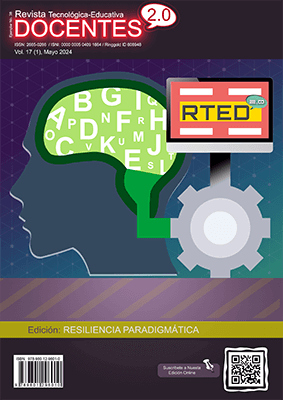Digital Marketing Plan for the Positioning of the Website paginasiete.bo the Newspaper Página Siete
 DOI:
https://doi.org/10.37843/rted.v17i1.476
DOI:
https://doi.org/10.37843/rted.v17i1.476
Main Article Content
Abstract
The Internet and different technological advances have revolutionized both information communication systems and commercial ones, endangering traditional media. For this reason, it was proposed to determine a digital marketing plan to improve the positioning of the paginate. The site serves as an innovative, differentiating, and even strategic support for companies whose purpose is to disseminate advertising in their digital edition. Mixed information was considered; a scientific method was carried out under the descriptive type with administrative documents of the organization and other investigations. There were people from La Paz, with an average age between 25 and 50 years, who had access to the Internet and strategic personnel from the company to contrast opinions with interviews. Subsequently, it was demonstrated how this plan could increase the income of this medium in its web edition with the SEO strategy, promoted with Facebook Ads to implement the project without requiring a large investment. Likewise, achieve alignments with areas involved in generating content and creating commercial ties with institutions outside the newspaper to achieve a fundamental positioning in the digital field, with the professional, editorial, and net trustworthy solvency of a newspaper that is always a legal and historical document.
Downloads
Metrics
Article Details

This work is licensed under a Creative Commons Attribution-NonCommercial-NoDerivatives 4.0 International License.
Those authors who have publications in our journal accept the following terms:
- When a work is accepted for publication, the author retains rights of reproduction, distribution of his/her article for exploitation in all countries of the world in the format provided by our magazine and any other magnetic medium, optical, and digital.
- Authors will retain their copyright and guarantee the journal the right first to publish their work, which will be simultaneously subject to the Creative Commons Acknowledgment License (Attribution-NonCommercial-NoDerivatives 4.0 International (CC BY-NC-ND 4.0)). That allows third parties to copy and redistribute the material in any medium or format, under the following conditions: Acknowledgment - You must properly acknowledge authorship, provide a link to the license, and indicate if any changes have been made. You may do so in any reasonable way, but not in a way that suggests you have the licensor's endorsement or receive it for your use. NonCommercial - You may not use the material for a commercial purpose. NoDerivatives - If you remix, transform, or build from the material, you cannot broadcast the modified material. There are no additional restrictions - You cannot apply legal terms or technological measures that legally restrict you from doing what the license allows.
- Authors may adopt other non-exclusive license agreements to distribute the published version of the work (e.g., deposit it in an institutional archive or publish it in a monographic volume) provided that the initial publication in this journal is indicated.
- Authors are allowed and recommended to disseminate their work through the Internet (e.g., in institutional telematic archives, repositories, libraries, or their website), producing exciting exchanges and increasing the published work's citations.
- Request of withdrawal an article has to be done in writing by the author to the Editor, becoming effective after a written response from the Editor. For this purpose, the author or authors will send correspondence via e-mail: [email protected].
- The author will not receive financial compensation for the publication of his work.
- All Docentes 2.0 Journal publications are under the Open Journal System (OJS) platform at: https://ojs.docentes20.com/.
References
Bernal Torres, C. (2016). Metodología de la Investigación. Pearson 3.
Cortés Cortés, M., & Iglesias León, M. (2004). Generalidades sobre la metodología de investigación. Universidad Autónoma del Carmen.
Crespo-Berti, L. A. (2022). Metacognición y Disrupción Digital Inmersiva en TIC desde los Nativos Digitales. Revista Docentes 2.0, 14(2), 48-56. https://doi.org/10.37843/rted.v14i2.334 DOI: https://doi.org/10.37843/rted.v14i2.334
Fuentes, S. (2021). Plan de marketing digital para el posicionamiento web del portal de revistas y publicaciones científicas de la Universidad La Salle – Arequipa. Arequipa, Perú [Tesis de grado para licenciatura en Marketing]. Universidad La Salle-Arequipa.
González, J. (2018). El posicionamiento web como herramienta clave del marketing digital. Universidad de Sevilla.
Heraldo (2016). ¿Cuál fue el primer periódico en tener edición digital? https://n9.cl/8npr4
Hernández S. (2014). Metodología de la investigación. McGraw-Hill
Lipinski, J. (2020). Facebook Ads: la guía completa para hacer publicidad en Facebook y acelerar tus resultados. Rd Station. https://bit.ly/3vlLJUa.
MarketerosLATAM (2022). Guía completa para hacer publicidad en Facebook Ads. https://n9.cl/tzs1a
Martínez-Hernández, C., Roque-Hernández, R. V., & Mendoza-Juárez, S. (2022). Validación por Expertos: Cuestionario para las Compras en Línea de Estudiantes Universitarios. Revista Docentes 2.0. 15(2), 68-75. https://doi.org/10.37843/rted.v15i2.342 DOI: https://doi.org/10.37843/rted.v15i2.342
Morales C. (2020). Se dispara el uso de redes sociales en Bolivia. Forbes. https://bit.ly/3M2jNu9.
Pacheco, J. (2021). Vea 10 indicadores de rendimiento de los procesos KPI. https://n9.cl/afte
Peiró, R. (2021). Diferencia entre SEO on page y SEO off page. https://n9.cl/tmgap
Rodríguez, A., & García, M., (2012). Estadística II. Universidad Nacional Autónoma de México.
Salvador, C. (2021). Google Analytics: 10 KPI o indicadores a tener en cuenta en SEO. https://bit.ly/3z4b4Tk
Santamaria, R. (2019). ¿Cuál es la diferencia entre White Hat, Black Hat y Grey Hat SEO? https://oinkmygod.com/blog/white-hat-seo/
Trackglobe.com. (2004). Generalidades sobre la metodología de investigación. Universidad Autónoma del Carmen. https://n9.cl/46yp3






